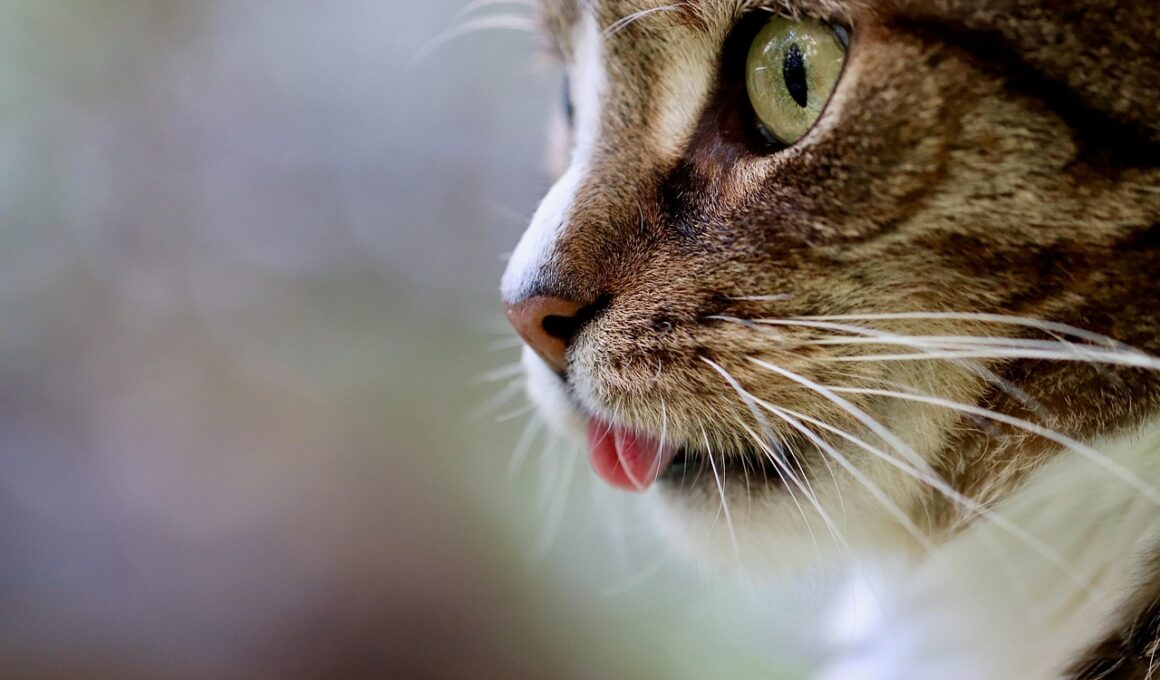Emotional Support: Cats and Their Role in Disability Management
For anyone dealing with a disability, emotional support is crucial to maintaining mental health. Cats can be surprisingly beneficial in this regard. They offer companionship and love, which can ease feelings of isolation. A cat’s purring is known to reduce stress while providing comfort. The act of petting a cat lowers blood pressure and relieves anxiety. Many individuals find it easier to engage socially when they have a cat by their side. Additionally, the rhythmic motion of grooming a cat can bring a sense of calm to both the pet and its owner. Through interaction, one can develop a deeper emotional connection with their feline friend. Cats are often more independent than dogs, requiring less attention, making them ideal for individuals with disabilities. Moreover, their playful antics provide laughter, which can be therapeutic. When a person feels overwhelmed, a cat’s presence can act as a grounding tool. Creating a safe space for a cat can help individuals with disabilities focus on their emotional well-being, enhancing their overall quality of life. In essence, the bond between a cat and its owner can be transformative in managing disability-related challenges.
Benefits of Cat Companionship for Emotional Health
Understanding the mental health benefits of cat companionship is essential. Cats can help their owners combat feelings of loneliness, ultimately improving emotional health. Having a non-judgmental, loving companion fosters a secure and warm environment. Moreover, cats are typically low-maintenance pets, making them easier for individuals with physical challenges to care for. Their independent nature allows them to thrive in various living situations, even those with limited space. Various studies indicate that pet ownership, especially cats, can result in decreased levels of cortisol. Lower cortisol levels lead to reduced stress, anxiety, and depression symptoms. In addition, many people experience increased happiness and life satisfaction when they adopt a cat. Regular interaction with a pet promotes routine and responsibility, aiding in behavioral improvements and self-esteem. This sense of purpose can be especially impactful for individuals with disabilities who may struggle with engagement in daily routines. Therefore, fostering a bond with a cat can offer emotional support to those navigating disability management, enhancing their overall well-being. Cats provide a unique blend of companionship and therapeutic benefits that can help create a fulfilling life experience.
Building a routine with your cat can lead to a sense of normalcy. Cats thrive on consistency, making it easier for their owners to create daily habits. Establishing feeding times, play periods, and grooming sessions allows individuals to take charge of their routines, improving mental clarity. Additionally, these shared experiences benefit both the owner and the cat, as they build mutual trust and understanding. Incorporating a cat into activities can help motivate individuals to become active, both physically and mentally. For example, engaging in interactive play with a cat encourages movement and can lead to light exercise. This physical activity, even in small amounts, can have positive effects on mental health. Furthermore, caring for a pet can instill a sense of accomplishment and purpose in one’s life. Cats can help distract from pain or discomfort, allowing their owners to enjoy their company instead. By focusing on this relationship, individuals can find joy even amidst challenges. Moreover, taking care of a cat can provide valuable lessons in patience and empathy, traits that may enhance personal growth. Providing a loving home for a cat can create life-changing benefits that extend well beyond companionship.
Social Connections Through Cats
Cats can play a significant role in enhancing social connections. Owning a cat often leads to social interactions among fellow pet owners, helping forge new friendships. People frequently share their cat experiences in community settings, whether online or locally. This sense of belonging can be particularly valuable for individuals with disabilities who may feel marginalized. Joining cat-centric groups or initiatives fosters a support network, creating bonds based on shared interests and challenges. Furthermore, therapy cats can provide emotional support beyond individual households, visiting hospitals and care facilities to uplift spirits. These interactions can lessen feelings of loneliness for patients and caregivers alike. Sharing stories or photos of one’s cat can also spark conversations, leading to deeper connections. Engaging with others about cats can help people realize they are not alone in their struggles, encouraging open dialogue about emotional well-being. This sense of community promotes understanding and reduces stigmas associated with disabilities. Consequently, social connections formed through friendships with fellow cat enthusiasts can positively impact mental health. In summary, cats can weaken social barriers and foster connections that are essential in disability management.
Providing a nurturing environment for cats is crucial to their well-being. This task promotes responsibility among cat owners, presenting an opportunity for personal growth. Individuals with disabilities often gain a sense of purpose from caring for their pet. Designing a welcoming living space, complete with cozy places to sleep and play areas, encourages healthy behaviors. Investing time and effort into a cat’s comfort enhances the overall pet-owner bond. Furthermore, a stable environment contributes to a cat’s positive disposition, ultimately benefiting its owner. Affectionate interactions like snuggling or gentle play sessions enrich both lives involved, fostering emotional healing. Understanding feline needs enables owners to experience joy when their cat thrives and flourishes in its environment. Additionally, teaching essential skills such as grooming and training can boost the owner’s confidence. Showing a cat love and attention builds a foundation of trust, leading to stronger emotional connections. By focusing on the nuances of pet ownership, individuals can cultivate mindful practices that enhance their quality of life. In turn, these developments can inspire personal achievements as owners navigate the complexities of disability management with their feline companion.
Training and Bonding with Your Cat
Training a cat can significantly enhance the bond between the pet and owner. Engaging in training sessions can create productive interactions that deepen their relationship. Simple tasks like litter training or basic commands cultivate trust and comprehension, making the cat feel secure in its environment. Spending quality time together during training can help individuals with disabilities practice patience and focus. Surprisingly, both cat and owner benefit from these activities, creating a collaborative dynamic. Teaching tricks or commands can offer mental stimulation for both parties while reinforcing positive behavior. Socialization through training can lead to a more confident cat, reducing anxiety in various situations. Cats that feel comfortable and well-adjusted will provide better emotional support. In essence, building skills together contributes to mutual respect and affection. The therapeutic effects of these interactions can lead to greater satisfaction for the owner, helping them to feel empowered. As individuals master training techniques, they also learn to recognize their cat’s unique personality. This knowledge fosters a deeper connection between them, making both lives even more fulfilling. In summary, training should be viewed as a bonding experience that enriches lives through shared growth and learning.
In conclusion, the emotional support offered by cats can offer tremendous benefits to individuals with disabilities. Cats possess a unique ability to connect with their owners, delivering companionship and comfort. Fostering these relationships leads to improved mental health outcomes, highlighting the essential role pets play in our lives. Furthermore, the routines developed through pet ownership can provide structure, enhancing overall emotional stability. The social connections formed through cat ownership can alleviate feelings of isolation, fostering a sense of belonging. Not only do they enrich our lives, but they bring joy and fulfillment that enhances personal drive. The lessons learned from caring for a cat often translate into other aspects of life. Individuals with disabilities discover their strengths as they navigate challenges through this dedicated bond. Moreover, the pet-owner connection reminds us of the profound impact animals have on human health. By embracing these companion animals, we pave the way for emotional well-being and healing. There are countless ways cats can assist in disability management, reaffirming their place in our lives as loyal companions. Ultimately, every moment spent with a cat is a step towards a more fulfilling life for both the pet and owner.
In the journey of cat adoption and emotional support, individuals with disabilities can find not just partners, but vital allies in their path to healing. Cats bring a wealth of benefits, providing emotional support that goes beyond mere companionship. They help reduce feelings of loneliness and instill a sense of purpose. With their quiet presence, cats create an environment of trust that empowers individuals to navigate their challenges effectively. As one shares life with a cat, they often discover remarkable strengths and resilience within themselves. The responsibility of caring for a feline friend fosters personal growth and accountability. Additionally, cats offer a unique form of therapy that promotes relaxation and well-being. Research continues to show the various positive impacts pets can have on mental health and emotional stability. The synergy created by the bond between cat and owner facilitates constructive coping strategies as individuals experience life’s difficulties. By focusing on emotional support through pets, individuals with disabilities can enhance their quality of life. In the end, it is this special bond that inspires hope and comfort, making the journey through disability management not just bearable but rewarding and meaningful.


